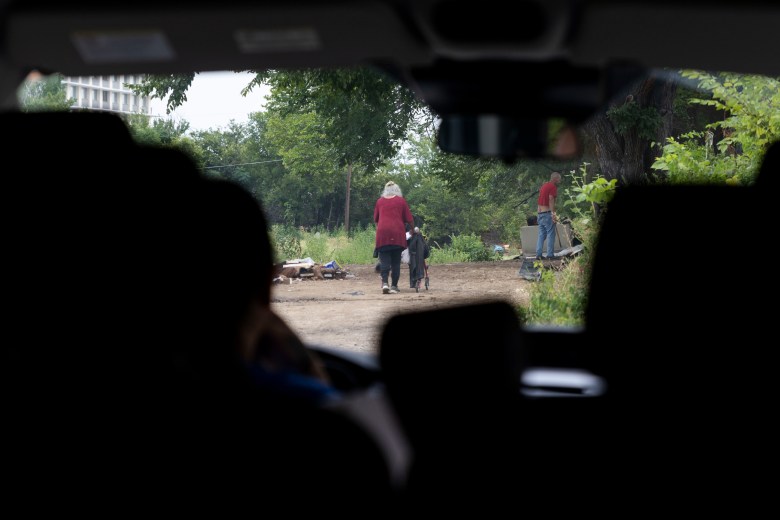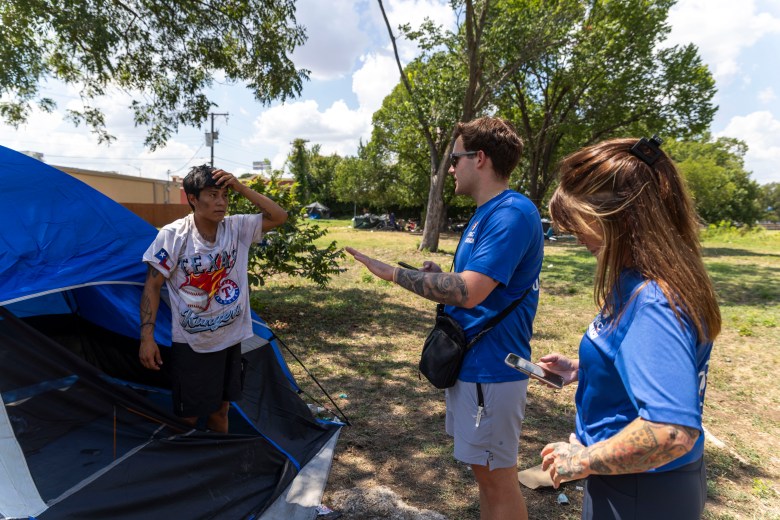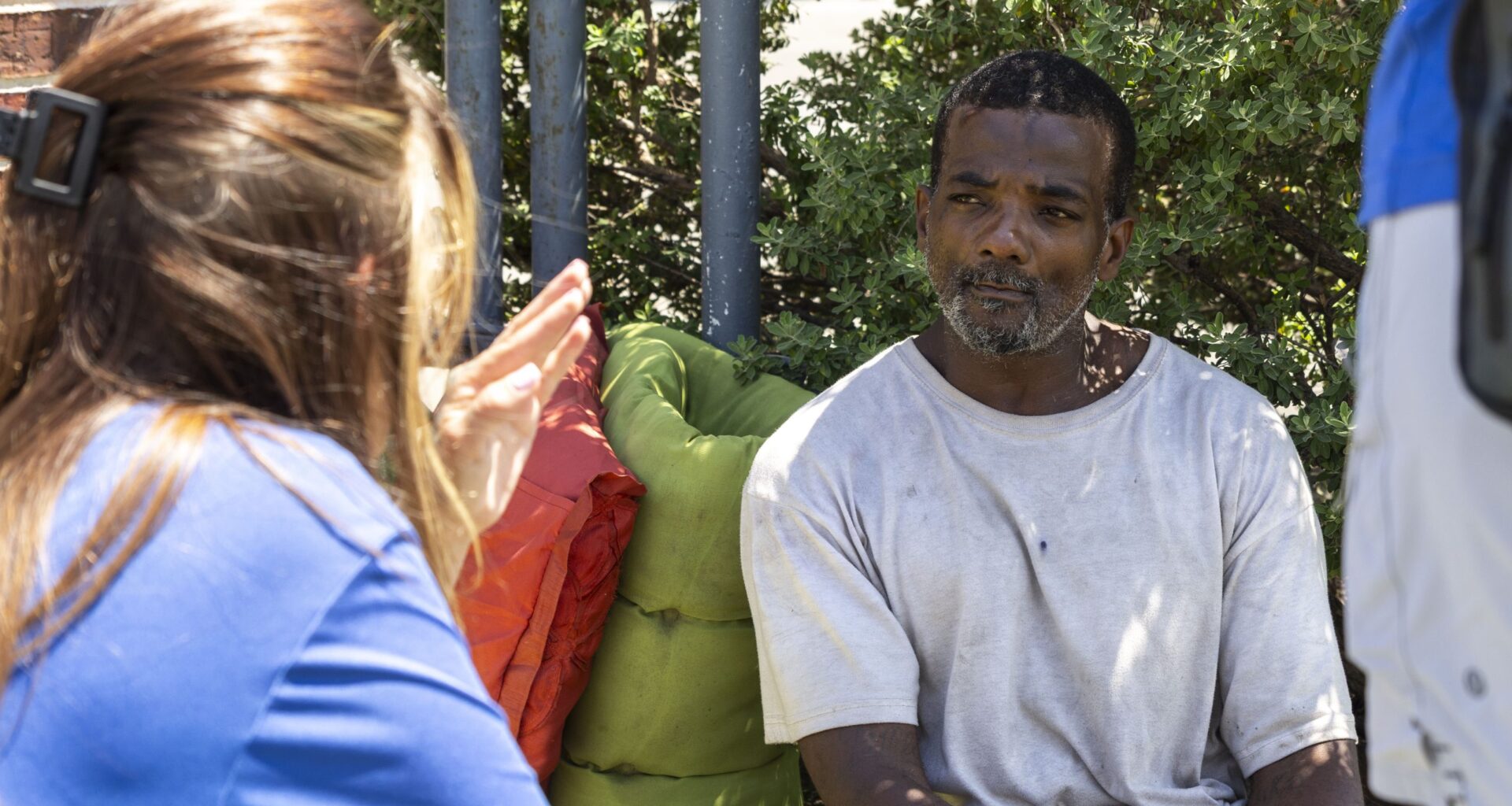U.S. Marine Corps veteran Tony Wilson knows the value of community.
Now the executive director of DRC Solutions, he said the spirit of teamwork at the Fort Worth-based nonprofit reminds him of his time in the Marines.
“It’s great working with peers who have empathy, recognize the meaning of community, and want to help their neighbors,” Wilson said. “If there are people in your community who need help, there’s a responsibility to offer that help.”
Stories of Honor is a Fort Worth Report weekly series spotlighting 12 Tarrant County veterans who are serving beyond the uniform.
We also are highlighting nonprofits recommended by the veterans.
In November, the veterans will gather for a luncheon where the Report will honor their service at the National Medal of Honor Museum in Arlington.
Wilson didn’t always think about mental health in the way he does now. It wasn’t until after his service that he began reflecting on trauma, his own struggles and those of his fellow Marines. He realized that if he needed help, others were in the same boat and lacked support.
DRC weaves that responsibility into its work.
Founded in 1999 as the Day Resource Center for the Homeless, the nonprofit initially provided essential services like showers, mail, computer access and phone calls to loved ones. In 2016, it transitioned into DRC Solutions, shifting focus to long-term housing, outreach and support services.
Today, DRC’s mission is clear: end homelessness by meeting people where they are, both physically and emotionally. Outreach teams walk under bridges, visit encampments and step into parks to connect with people who might never enter a shelter.
DRC provides help by replacing IDs, conducting housing assessments and even reunites families. Veterans, families and youth are prioritized, but no one is turned away.
 Homeless people walking as a DRC Solutions van pulls up Aug. 20, 2025, in Fort Worth. (Mary Abby Goss | Fort Worth Report)
Homeless people walking as a DRC Solutions van pulls up Aug. 20, 2025, in Fort Worth. (Mary Abby Goss | Fort Worth Report)
“Those people deserve housing just as much as everybody else,” Wilson said. “Just because someone doesn’t stay in a shelter doesn’t mean they’re not worthy of housing.”
Affordable housing remains the biggest challenge, Wilson said. Most of the people DRC assists have been homeless for years.
Nationally, men account for 60% of the nation’s homeless population and are more likely to be unsheltered, according to the American Institute for Boys and Men.
Over the past decade, the number of Americans experiencing homelessness has increased by 37%, with homeless men accounting for half of that increase.
For DRC, the solution isn’t quick fixes but building stability over time. Case managers continue working with clients even after housing is secured. They help with groceries, doctor visits, school enrollment or simply offering presence when someone feels invisible.
“Imagine experiencing homelessness and people won’t even look you in the eye or wave,” Wilson said. “It’s got to feel so disheartening.”
The stakes can be deadly. In Texas, roughly 1,500 people in Texas die annually from extreme heat, and advocates estimate that about half are people experiencing homelessness, according to the Texas Homeless Network.
Critical documents specialist Denise Yeager sees the impact directly. She helps roughly 15 to 30 clients a day replace birth certificates, driver’s licenses or IDs — documents often lost or damaged, especially when traveling from other states.
“It warms my heart knowing that I’m doing something to make a difference in their life and to give them hope,” Yeager said.
She recalled one client who began crying after receiving her new ID.
“She said, ‘I feel like a person now.’ I started crying and said, ‘You’ve always been a person,’” Yeager said. “A lot of people feel like they’re not real without an ID.”
In 2024, DRC supported 1,856 individuals for housing, including 125 chronically homeless households. DRC’s critical documents specialists aided 2,632 people in replacing 4,140 identity documents.
“We’re one of the largest producers of critical documents in Tarrant County, board chair Bob McCarthy Sr. said. “It’s a big part of what we do.”
 DRC mobile assessors Will McNichols, middle, and Elizabeth Peznell, right, register a homeless person Aug. 21, 2025, in Fort Worth. (Mary Abby Goss | Fort Worth Report)
DRC mobile assessors Will McNichols, middle, and Elizabeth Peznell, right, register a homeless person Aug. 21, 2025, in Fort Worth. (Mary Abby Goss | Fort Worth Report)
Breaking the cycle is critical, Wilson said. Homelessness isn’t a one-size-fits-all problem. Some clients require short-term utility assistance, while others have been outside for years.
About 25% of DRC clients enter the workforce with support from benefit specialists, Yeager said.
Housing navigation secured stable housing for 373 households, and the Arlington mobile system navigator aided 161 households.
DRC’s housing programs supported 158 formerly chronically homeless households, added 96 new households to its permanent supportive housing, and sustained support for 256 households.
For Wilson, the mission is both personal and professional.
“I wanted to help people who were hurting, not to hurt,” Wilson said.
Orlando Torres is a reporting fellow for the Fort Worth Report.
At the Fort Worth Report, news decisions are made independently of our board members and financial supporters. Read more about our editorial independence policy here.
Related
Fort Worth Report is certified by the Journalism Trust Initiative for adhering to standards for ethical journalism.
Republish This Story
Republishing is free for noncommercial entities. Commercial entities are prohibited without a licensing agreement. Contact us for details.


